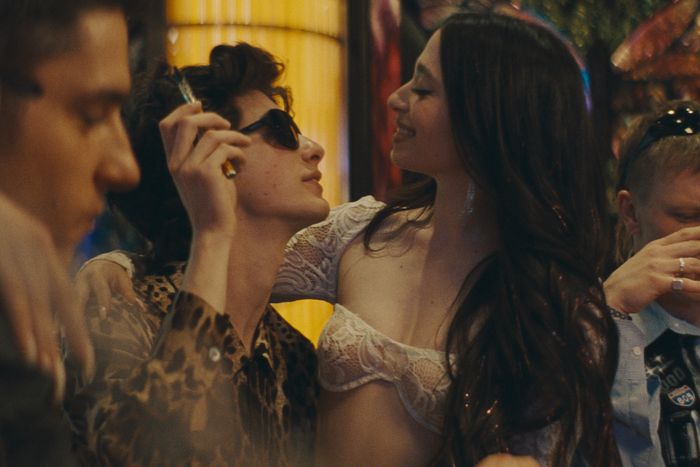
Spoilers ahead for the plot and ending of Anora.
Sean Baker’s Anora ends with a sex scene — the last and the saddest of several we see over the course of his funny and heartbreaking new tragicomedy. In a parked car, erotic dancer Ani (Mikey Madison) straddles Igor (Yura Borisov), the Russian henchman who’s been her undesired shadow for a couple of very long, very stressful days. This final scene is a kind of mirror image of the film’s first, which introduces Ani bumping and grinding through a private dance at the Brighton Beach strip club where she works. The contrast between these bookends is stark: Whereas Anora opens with pulsing light, throbbing music, and simulated erotic bliss, it closes with dreary snowfall, the rhythmic whir of windshield wipers, and a moment of unsimulated carnal connection much more desperate than joyful. The real symmetry here lies in how little Ani’s life has changed from the start of the film to the finish.
Over the course of Anora, Baker subverts Hollywood crowd-pleasing tradition twice over. The overarching structure of the movie is a rude awakening, a nasty hangover: If the first hour passes in a dreamy blur, like a euphoric speedrun of Pretty Woman — with Ani as the sex worker swept off her feet by a chivalrous john, in this case the young Russian playboy Vanya (Mark Eydelshteyn) — the second half slows to a crawl to disabuse the heroine and the audience of any illusions about this whirlwind storybook romance. But even as Baker blows up the Cinderella story he seemed to be telling, he plants the seeds of another kind of fairy tale, encouraging us to hang our hopes for a happy ending on a different set of romantic-comedy clichés.
The Anora Reader
Most of them involve Borisov’s Igor. He enters the story at the moment Vanya is running out on Ani, abandoning his new wife to his father’s goons in a childish last-ditch attempt to extend his American joy ride and delay being dragged back to Russia. Ani and Igor’s first encounter isn’t exactly a meet-cute: Though he’s initially polite to her, it isn’t long before Igor is following the orders of his boss, Vanya’s godfather Toros (Karren Karagulian), and preventing Ani from leaving the family mansion — a struggle that disturbingly escalates to him forcing her onto the couch, tying her hands together, and eventually pulling her on top of him. The assault isn’t explicitly sexual in nature, or even sadistic in intent, but it’s still an upsetting abuse of power, made all the more queasy for how Igor pinning Ani to his body perversely mimics the physical intimacy of a lap dance.
Because of how awful everyone is to Ani in Anora’s screwball second half — Vanya included and maybe especially — Igor ends up looking like her only ally, even after he subjects her to what she correctly identifies as, essentially, battery and kidnapping. Baker goes out of his way to distinguish Igor from Vanya, temperamentally, physically, and economically: The polar opposite of a scrawny, exuberant rich kid, the former is a quiet working-class guy (Ani calls him a gopnik, derogatory Russian slang that’s roughly equivalent to “thug”) who keeps his cucumber cool throughout. You could say that Igor is everything Vanya isn’t. And he keeps finding small ways to express his sympathy for the young woman he’s been hired to guard and manhandle while the employees of Vanya’s family race around New York to find the kid, intent on annulling his marriage. Baker cuts to conflicted close-ups of Igor, underscoring his pangs of conscience on the periphery of the plot.
In that respect, Anora is playing on the rom-com archetype of the secret Mr. Right hiding in plain sight — the real love interest our heroine needs to recognize has been right under her nose the whole time. Borisov has actually played such a role before, having previously starred as a boorish Russian dude who slowly reveals his softer side in the Finnish romantic comedy Compartment No. 6. Of course, Baker has complicated this common trope by building Ani and Igor’s dynamic on a foundation of violent control. She never lets him (or us) forget the circumstances under which they met, the moment when he pinned her to the couch and to his body. (One damning detail: When Igor offers a cold, shivering Ani a scarf, it’s the same one he used to gag her and muffle her screams a few hours earlier.) At the same time, Ani’s defiant refusal to warm to her assailant feeds into another rom-com formula: the love story that flowers out of an adversarial relationship. Ani’s volley 0f insults — the spiky flip side to how she turns on the charm for her clients — could be seen as a particularly volatile variation on the rom-com heroine too headstrong to fall in love with a cad. Until she does.
It all leads to that last scene, that rendezvous in the car, when Ani finally softens to Igor and Anora seems to fulfill the romantic-comedy arc Baker has been laying out. Except that there’s little sense of cathartic release or stirring of romantic feeling in their sex, which is blocked to remind us of the last time Ani was in Igor’s lap, and which ends with her frantically slapping him, then breaking down in tears. To the extent that we’re seeing a real connection in this parting embrace, it’s one of mutual dismay between two people exploited by the same ultrarich family, both valued only for their bodies and what they have to offer physically. It’s less a rapturous consummation of their growing feelings for each other than a bittersweet commiseration.
Is this the best Ani can hope for? Any relationship with Igor would start from a power imbalance, given how they met. However kind he might really be — and Baker does, rather provocatively, encourage us to see his sensitivity as genuine — this is still a man who pinned and bound and gagged her at the ask of others. And it’s telling that she climbs onto Igor after he offers her a parting kindness, a kind of consolation prize for the hellish ordeal she’s just been through: the return of the engagement ring Vanya’s family forcefully removed from her finger. It’s one last sad echo, her sham nuptials reflected back at her in a symbol of how transactional the relationship really was. For Ani, there is no fairy-tale ending. Her Disney daydream of being whisked away by a prince is as unreal as the fantasy she offers her clients … or the romantic comedy ‘Anora’ puts in our heads and then harshly denies us.
More on ‘Anora’
- Awards Season Starts … Now!
- Why Did Sean Baker Avoid Politics in His Films Until Anora?
- What Makes Us So Sure Sean Baker Can Sneak Anora Into the Oscars?


